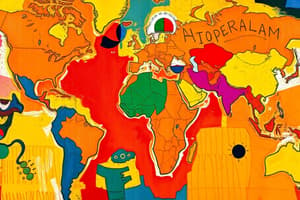Podcast
Questions and Answers
What is the impact of imperialism on indigenous communities according to the text?
What is the impact of imperialism on indigenous communities according to the text?
- Preservation of pre-Columbian civilizations
- Increase in indigenous control over resources
- Near-destruction of pre-Columbian civilizations (correct)
- Promotion of cultural diversity
Which key event characterized the Age of Colonization?
Which key event characterized the Age of Colonization?
- Global peace treaties
- Trade agreements with indigenous populations
- Decolonization of European territories
- Establishment of European colonies and exploitation of indigenous labor (correct)
How did the Columbian Exchange impact global agriculture and cuisine?
How did the Columbian Exchange impact global agriculture and cuisine?
- Increase in reliance on traditional crops
- Decrease in diversity of crops worldwide
- No significant impact on global agriculture and cuisine
- Introduction of new plants like corn, potatoes, and tomatoes (correct)
What role did imperialism play in the exploitation of indigenous labor and resources?
What role did imperialism play in the exploitation of indigenous labor and resources?
Which factor played a significant role in shaping the global society during historical globalization?
Which factor played a significant role in shaping the global society during historical globalization?
What devastating consequences did the spread of diseases like smallpox have on indigenous populations?
What devastating consequences did the spread of diseases like smallpox have on indigenous populations?
How did the end of mercantilism impact the Canadian economy?
How did the end of mercantilism impact the Canadian economy?
What key role did capitalism play in the development of globalization?
What key role did capitalism play in the development of globalization?
How did the Industrial Revolution impact globalization?
How did the Industrial Revolution impact globalization?
What was one primary aim of mercantilism during Canada's colonial periods?
What was one primary aim of mercantilism during Canada's colonial periods?
Flashcards are hidden until you start studying
Study Notes
Historical Globalization: Impact of Imperialism on Indigenous People and Canadian People
Historical globalization refers to the long-term processes through which the world has become more interconnected, leading to the creation of a global society. Several key factors, including imperialism, the Industrial Revolution, capitalism, the Silk Road, and mercantilism, played significant roles in shaping this global society.
Imperialism and Indigenous People
Imperialism, defined as a form of domination in which a state or state-sponsored group exercises direct control over the territory and resources of a foreign people, had a profound impact on indigenous communities worldwide. This was particularly true in the Americas, where the European discovery and colonization of the land led to the near-destruction of pre-Columbian civilizations. The Age of Colonization, which began in the late 15th century and continued through the 18th century, saw the establishment of European colonies and the exploitation of indigenous labor and resources.
The Columbian Exchange, a term used to describe the enormous exchange of plants, animals, foods, human populations, communicable diseases, and culture between the Eastern and Western hemispheres, was a result of this colonization process. The exchange of plants, such as corn, potatoes, tomatoes, tobacco, and chocolate, had a significant impact on global agriculture and cuisine. However, it also led to the spread of diseases like smallpox, which had devastating consequences for indigenous populations.
Imperialism and Canadian People
Canada's history was deeply influenced by imperialism, particularly during the French and British colonial periods. Enslaved indigenous people were used in various labor roles and economic activities, including the fur trade, where they either assisted traders or were traded for furs. The end of mercantilism, which was a system of economic policies primarily aimed at promoting the wealth of the mother country, led to the growth of a capitalist economy in Canada.
Industrial Revolution and Globalization
The Industrial Revolution, which began in the late 18th century, marked a significant turning point in global history. It led to the development of new technologies and manufacturing processes, which in turn increased the efficiency of production and transportation. The impact of the Industrial Revolution on globalization was profound. It led to the mass production of goods, which could be traded globally, and the development of new transportation technologies, such as steamships and railways, which made global trade more efficient.
Capitalism and Globalization
Capitalism, an economic system characterized by private or corporate ownership of capital goods, the means of production, and the means of distribution of goods and services, played a crucial role in the development of globalization. The Industrial Revolution led to the growth of capitalist economies, which in turn led to the expansion of trade and the development of global markets.
Silk Road and Globalization
The Silk Road, a network of trade routes that connected the East and the West, played a crucial role in the development of globalization. The establishment of these trade routes led to the exchange of goods, ideas, and cultures between different regions of the world. The Silk Road marked the beginning of globalization, as it was the first time that goods traveled such long distances and were traded on a large scale.
Mercantilism and Globalization
Mercantilism, an economic theory and policy practiced during Canada's colonial periods, was primarily aimed at enriching European powers. It involved the establishment of colonies to extract resources and the exploitation of indigenous labor. Mercantilism fell out of favor in the late 18th century, as it was criticized for being overly dependent on the export of certain key resources, or staples, and for hindering the development of more diversified local economies.
In conclusion, historical globalization was shaped by a complex interplay of factors, including imperialism, the Industrial Revolution, capitalism, the Silk Road, and mercantilism. These factors had both positive and negative impacts on different communities around the world, and their legacy continues to shape the global society we live in today.
Studying That Suits You
Use AI to generate personalized quizzes and flashcards to suit your learning preferences.




